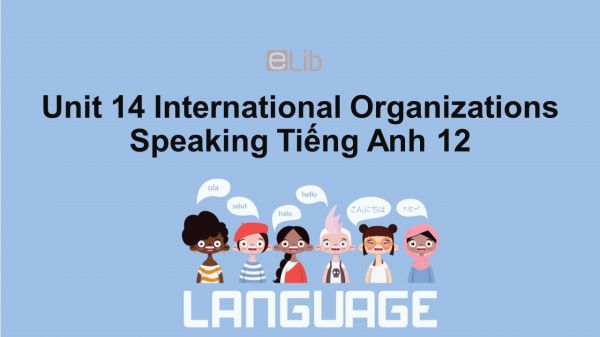Unit 14 lớp 12: International Organizations-Speaking
Bài học Unit 14 Lớp 12 International Organizations phần Speaking giúp các em có thêm nhiều thông tin về năm thành lập, trụ sở chính, mục đích cũng như các hoạt động chủ yếu của các tổ chức; từ đó tổng hợp thông tin và trình bày trước lớp.
Mục lục nội dung

1. Task 1 Speaking Unit 14 lớp 12
Read the passage and answer the questions (Đọc đoạn văn và trả lời câu hỏi)
WHO
The World Health Organization (WHO) is the United Nations specialized agency for health. It was established on 7 April 1948. WHO’s objective, as set out in its Constitution, is the attainment by all peoples of the highest possible level of health. WHO’s main activities are carrying out research on medical development and improving international health care.
1. What does WHO stand for?
(WHO viết tắt là gì?)
2. When was WHO established?
(WHO được thành lập khi nào?)
3. What is its major objective?
(Mục tiêu chính của nó là gì?)
4. What are its main activities?
(Các hoạt động chính của nó là gì?)
Guide to answer
1. WHO stands for World Health Organization.
(WHO là viết tắt của World Health Organization.)
2. It was established on April 7 1948.
(Nó được thành lập vào ngày 7 tháng 4 năm 1948.)
3. Its objective is the attainment by all the peoples of the highest possible level of health.
(Mục tiêu của nó là đạt được tất cả các dân tộc có mức sức khoẻ cao nhất.)
4. Its main activities are carrying out research on medical development and improving international health.
(Các hoạt động chính của dự án là nghiên cứu phát triển y tế và nâng cao sức khoẻ quốc tế.)
Tạm dịch
WHO
Tổ Chức Y Tế thế giới (WHO) là một tổ chức chuyên ngành Liên Hiệp Quốc về y tế. Nó được thành lập ngày 7 tháng Tư năm 1948. Mục tiêu của WHO, như được đăt ra vì bản Hiến Pháp của nó, là tất cả các dân tộc đạt được trình độ y tế cao nhất có thể được. Những hoạt động chính của WHO là thực hiện những cuộc nghiên cứu về phát triển y học và cải thiện chăm sóc y tế quốc tế.
2. Task 2 Speaking Unit 14 lớp 12
Below is some brier information about two international organizations. Work in pairs. Ask and answer questions about them
(Dưới đây là một vài thông tin ngắn về hai tổ chức quốc tế. Làm việc từng đôi. Hỏi và trả câu hỏi về chúng)
Tạm dịch
Guide to answer
WWF:
A: What does WWF stand for?
B: It stands for World Wildlife Fund.
A: When was it established?
B: In 1961.
A: Where is its head office located?
B: In New York.
A: What are its aims?
B: Its major aims is to protect endangered wild animals and their habitat.
A: What are its activities?
B: Its main activities are carrying out research on endangered species and collecting data on rare and endangered animals and plants.
Tạm dịch
A: WWF viết tắt cho cái gì?
B: Nó viết tắt cho Quỹ quốc tế bảo vệ thiên nhiên.
A: Nó được thành lập khi nào?
B: Năm 1961.
A: Trụ sở chính được đặt ở đâu?
B: Ở New York.
A: Mục đích của nó là gì?
B: Mục đích chính là bảo vệ động vật hoang dã có nguy cơ tuyệt chủng và môi trường sống của chúng.
A: Các hoạt động chính của nó là gì?
B: Các hoạt động chính của nó là thực hiện việc nghiên cứu các loài có nguy cơ tuyệt chủng và thu thập dữ liệu về động thực vật quý hiếm và có nguy cơ tuyệt chủng.
3. Task 3 Speaking Unit 14 lớp 12
Tell a partner what you know about one of the above mentioned international organizations. Use the information from Tasks 1 and 2
(Kể cho một bạn cùng học những gì em biết về một trong hai tổ chức quốc tế được nói đến ở trên. Dùng thông tin ở Task 1 và 2)
Guide to answer
I am going to tell you about the WWF. First, its name stands for World Wildlife Fund. This organization founded in 1961, has its headquarters in New York. Its aims are to protect endangered wild animals and their habitats. WWF's main activities are to carry out research on endangered species and collect data on rare and endangered plants and animals. So far, thanks to its activities, a large number of endangered animals have been saved and preserved in reserves.
4. Practice
4.1. Fill in the gaps
Fill in each numbered blank with one suitable word or phrase (Điền vào chỗ trống từ hay cụm từ phù hợp)
Under the global "health for all" strategy, WHO (the World Health Organization) and its members have placed special emphasis (1) _____ the developing countries. Nevertheless, the benefits of WHO's international health work are benefited by all countries, including the most developed ones. For example, all nations have benefited from their contributions to the WHO programs that led to the global (2) _____ of smallpox and to better and cheaper ways of controlling tuberculosis.
(3) _____ is a key word in WHO's programs. The organization believes that immunization, (4) _____ prevents the six major diseases of childhood-diphtheria, measles, poliomyelitis, tetanus, tuberculosis, and whooping cough-should be (5) _____ to all children who need it. WHO is leading a worldwide campaign to provide effective immunization for all children in (6) _____ with UNICEF. Provision of safe drinking water for all is one of the objectives of the International Drinking Water Supply and Sanitation Decade proclaimed by the UN General Assembly in 1980 and (7) _____ by WHO. WHO is also active in international efforts to combat the diarrheal diseases, killers of infants and young children. The widespread introduction of oral rehydration salts, together with improved drinking water supply and sanitation will greatly reduce childhood mortality from diarrhea.
WHO's program for primary health (8) _____ comprises eight essential elements:
- Education concerning prevalent health problems and the methods of preventing and controlling them;
- Promotion of food supply and proper nutrition;
- Maintenance of (9) _____ adequate supply of safe water and basic sanitation;
- Provision of maternal and child health care, including family planning;
- Immunization against the major (10) _____ diseases;
- Prevention and control of locally endemic diseases;
- Appropriate treatment of common diseases and injuries; and
- Provision of essential drugs.
These eight elements were defined in the Declaration of Alma-Ata, which emerged from the International Conference, on Primary Health Care in 1978.
1. a. on b. in c. for d. with
2. a. campaign b. spread c. eradication d. epidemic
3. a. Prevent b. Prevention c. Preventable d. Prevented
4. a. whom b. whose c. that d. which
5. a. prepared b. concerned c. interested d. available
6. a. organization b. establishment c. cooperation d. protection
7. a. supported b. related c. treated d. attracted
8. a. attention b. care c. medicine d. danger
9. a. a b. an c. the d. Ø
10. a. infect b. infected c. infectious d. infection
4.2. Multiple-choice
Để củng cố kĩ năng phát âm và nhấn âm ở các từ khác nhau, mời các em cùng đến với phần đề kiểm tra trắc nghiệm Unit 14 Speaking Tiếng Anh 12 sau đây và cùng luyện tập.
5. Conclusion
Qua bài học này các em đã được tìm hiểu về một số tổ chức quốc tế nổi tiếng trên toàn thế giới như: WHO, UNICEF, WWF. Các em sẽ được luyện tập nói về thời gian hình thành, mục đích, trụ sở chính và các hoạt động chính của nó cũng như một số thông tin khác.
Tham khảo thêm
- doc Unit 14 lớp 12: International Organizations-Reading
- doc Unit 14 lớp 12: International Organizations-Listening
- doc Unit 14 lớp 12: International Organizations-Writing
- doc Unit 14 lớp 12: International Organizations-Language Focus





.png)
